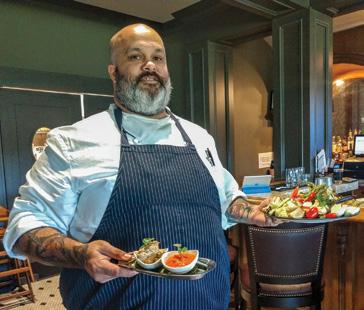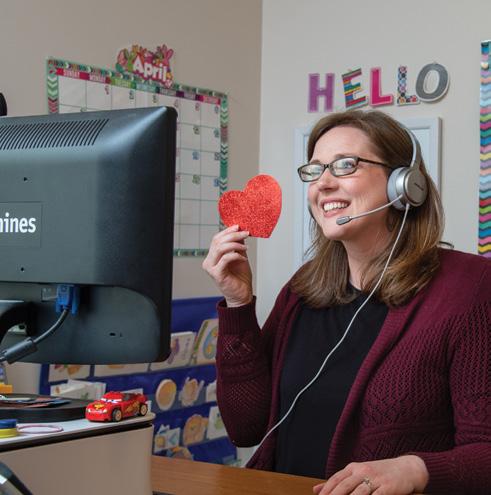
4 minute read
Lights, camera...
Lights, camera...
A local film commission brings the ‘action’ to Kentucky
Story by LAZ DENES
Glitz meets grits whenever the Hollywood film industry sets up shop in mostly rural Southern Kentucky, a favorite stopping point for more than half a century among producers, directors and location managers.
Since the creation of the Southern Kentucky Film Commission in 2016, movie and television projects have become more common than ever throughout the lower half of the Bluegrass State. And that activity brings national and even worldwide attention, along with significant economic benefits for one of the most scenically diverse regions in all of North America.
A friendship between Hart County Judge Executive Terry Martin and longtime actor and producer Branscombe Richmond brought about the idea of a regional film commission to formalize the process of luring movie and television projects to Southern Kentucky. The state had incentives in place that offered between 30% and 35% in tax credits for qualifying in-state movie and television projects. “Kentucky’s tax incentives being one of the best in the United States, our location being in the center of the state was prime,” Martin says on the Kentucky Film Office website.

Movie producers have set their sights — and cameras — upon rural Kentucky as the backdrop for numerous films in recent years.
Richmond, whose list of credits includes the motion pictures “Commando,” “Action Jackson” and “Hard to Kill,” was completing a six-week shoot in Hart County when the idea of forming the film commission came about. “I think we’re pretty good,”

“The Silent Natural” producer Branscombe Richmond, left, had a role for Coni Shepperd as an extra in the baseball bio-pic set in the 1800s. He was also an actor in “Disturbing the Peace.” Both movies were filmed locally in recent years.
Richmond, who is an advisory member of the Southern Kentucky Film Commission, says on the Kentucky Film Office website. “I think we’re strong in a field of many states and countries that come to Hollywood and say, ‘Please spend your dollars, please film in our state, country or county.’”
Tax incentives aside, the selling point for the film commission includes Southern Kentucky’s vast array of location options. The region is home to one of the most diverse rivers in North America and the longest cave system in the world. It offers the popular Corvette Museum in Bowling Green and one of the nation’s oldest racetracks, along with Civil War battlefields, historic neighborhoods, countless square miles of scenic farmland, large manufacturing plants and small cottage industries.
The payoffs for the residents and small businesses of Southern Kentucky are significant with every film project that comes to the region. “The average local spend when a production company comes to town is about $500,000,” says Coni Sheppard, Southern Kentucky Film Commission president and executive director of the Munfordville Tourism Commission.
“The film commission was formed because we wanted our towns and counties to get that kind of money — $500,000 is a lot of money for any small town,” she says. “We started asking the neighboring counties to join, and that’s how it all grew. All of the commissioners are tourism directors. We set up our booth each year at the American Film Market convention out in Southern California where location managers come from all the big production companies. We tell them about our area and everything we have to offer. Between that and our website, it’s been very successful.”
Sheppard says most every county in Southern Kentucky has reaped the benefits of having a production company in the area. “One of them was called ‘Mail Order Monster,’ and it was shot right here in Munfordville,” she says. “They filmed at the local school and used 85 kids. They built this huge monster, and the kids had a really good time. We’ve had a couple in recent years down in Glasgow and some in Oak Grove and Hopkinsville. Branscombe Richmond and his company shot one about a motorcycle gang, and it used a lot of local people. All of the production companies who come through have been really nice.”
In turn, the production companies tend to enjoy the local residents and their Southern hospitality, and they patronize local business in most every sector, Sheppard says. Whether the pro duction is a feature film, television series, commercial or music video, the commission serves as liaison, helping to make community connections to find the services and resources needed to make every project a success.
“It’s exciting for everybody when the production companies are in the area,” Sheppard says. “The hotels and restaurants are full, the food services people buy their groceries locally, the props coordinators use local sign shops and other local business. The list is endless. They also use the services of local law enforcement, fire departments and paramedics. They come with their phones from out of town, and we work with SCRTC to help get them local phones and internet access.”
Richmond, a huge fan of the region, is helping open a full-functioning movie studio in Horse Cave. The local film industry will use it as a base of operations for out-of-town production companies, and the studio will be able to ship needed equipment anywhere in the state, saving producers the hassle of bringing it in all the way from Southern California or other faraway places. “There is a community of talented filmmakers, musicians, writers and people behind the camera that are trying to continue their vocational trade in Kentucky,” Richmond says in a Bowling Green Daily News article about the studio’s official groundbreaking last August.
“Southern Kentucky has seen probably more movies and video projects shot here than just about anybody around,” Sheppard adds. “But we work really, really hard to get them here.”






